3 Secrets to Gut Health That Have Nothing to Do with Nutrition
We hear so much about how food choices impact our gut health and microbiome. It's true. Nutrition plays an important role. If you want to learn more about this (or get a refresher), read this post and this one. But nutrition is not and should not be the only area of our life we prioritize when it comes to our (gut) health.
If we're in a chronically negative head space, our life feels stagnant, or we don't manage stress and anxiety well, no amount of kimchi, kombucha, or probiotic supplements will fix our digestive troubles. Assuming we don't have an underlying food sensitivity or a bacterial overgrowth such as candida, there are many factors outside the kitchen that cause digestive distress including changes in motility, permeability, gastric secretion, and the balance of good and bad bacteria.
Below are three secrets to gut health that have nothing to do with nutrition and everything to do with the HOW: how we live and how we eat. These are secrets that research has proven and that I've witnessed having a tremendous impact on my clients' gut health and general well-being.
Talk less, chew more
We scarf down our food and we're not good listeners. It's no coincidence these two points share a sentence. We get caught up in the momentum of our day that we don't realize how we maintain a frenetic energy through meal time, moving quickly and pushing our ideas forward. Nor do we realize how this leads to digestive symptoms or heaviness and lethargy afterward.
Challenge yourself to eat with more intention; to chew mindfully, tune in to the tastes and textures of the food, take the opportunity to listen more than you talk, and savor the meal.
By doing this, we should be able to extend the length of time eating beyond the 20 minute mark, at which point our brain catches up with our stomach's fullness cues. This allows us to eat a more appropriate and comfortable (!) amount of food. Plus, being mindful of our food - and the other person - while we eat leaves us more satisfied, with fewer post-meal cravings or impulses to nibble, and the other person feeling heard. Win. Win.
Be kind to yourself
We have pathways of conditioned habit patterns such as self-criticism, comparison, and constant striving. Turning to these harsh states of mind activates the fight-or-flight response in our body and triggers stress hormones such as cortisol and adrenaline. In this stressed state, blood flow is diverted away from our digestive tract, preventing food from being metabolized.
On the other hand, Dr. Kristin Neff, associate professor in University of Texas at Austin's Educational Psychology department and pioneer researcher of self-compassion, hypothesizes practicing self-compassion calms our nervous system, bringing us to the rest-and-digest state. You may remember from the article linked above, this is the ONLY state in which our body can properly digest food.
Practicing self-compassion, even if we're not always successful, breaks the habitual negative thought patterns and may keep our digestive system out of that chronic state of distress. See this 2-minute video for tips to practice self-compassion.
Digest your emotions
When we suffer from IBS or acute gas, cramping, constipation or diarrhea, there's often a corresponding emotion. The BGA (brain-gut axis) allows the brain and gut to communicate via neural and endocrine pathways and is susceptible to stress. In other words, psychological factors impact physical factors in our gut, triggering muscle contractions that cause inflammation and pain or a change in the quality and quantity of good bacteria.
How do we address these psychological factors? Recognize that sometimes, when our digestion is not working properly it's a reflection of something in our life that’s not moving.
Get curious and ask yourself:
Where do I feel stuck in my life? What's not moving freely right now?
You might uncover that a stalled work project, the argument you had that morning, feeling ambivalent about an important decision, or being anxious about an upcoming test is taking a greater toll on your physical body than you imagined.
Emotional distress often stems from ignoring or suppressing uncomfortable feelings. We want to digest our emotions properly by acknowledging, allowing, then processing those feelings. It helps to visualize an emotion in the body so it's more tangible, as guided to do in this meditation. I teach many strategies to my clients, and it's important that you get the support you need for your mental and physical health.














